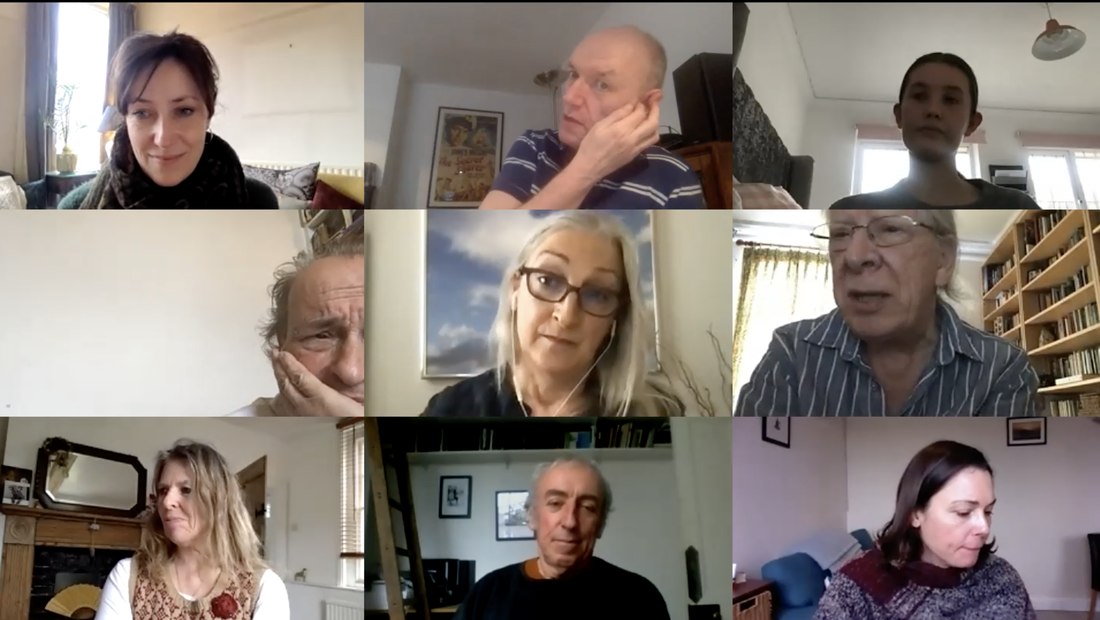|
March 26th. Present (row-by-row from top left) Charlotte Pyke; Colin Ellwood; Emma Cawley; Simon Usher; Susan Raasay; David Whitworth; Juliet Gray; Kevin McMonagle; Zara Tomkinson; Valerie Gogan (pictured below)
By way of complete contrast to recent sessions, here a relatively early (but in broader terms, relatively recent) David Eldridge single-set four-act ‘chamber’ drama originally produced at The Bush in 2004. Clearly the writer is channelling – and presumably re-working - very personal memories from Romford in the early ‘80s. Eleven-year-old only child John is the loved focus of his parents’ life. His mother Alice is trying to get him to read David Copperfield as preparation for a scholarship bid to get into public school, but his market trader dad seems less keen. John is definitely not a Dickens fan, nor of any grown-up books, and is also falling out of love with his Subbuteo set, at least as far as playing against his father is concerned. In fact he is now obsessed with projecting ‘Mutually-Assured-Destruction’ cold-war tensions onto his toy soldiers, in the process using them to manage and simplify all kinds of anxieties, including the fall-out from his parents’ rocky marriage and the slow impingement of the adult world into his childhood Eden. By means of the playwright's slightly creaky dramatic device, through which John ends up hiding in a large cardboard box, he overhears his mum's marital-row revelation that she is sexually bored with her husband and has slept with the quietly charming (and as it turns out deeply dishonest) Luigi, a conjugal bystander who helps out on dad's market stall. Complicating things is the fact that John has shared some of his fears and imaginings with Luigi, including his vivid sense of the consequences for himself and his parents of the likely forthcoming nuclear holocaust. In the vividness of John’s apocalyptic imaginings and in the managing of his fears through proxy toy figures, there are surely signs of the budding dramatist in John. On the morning after his mothers’ revelations, he tries to restore his sinking Eden and to ensure his parents stay together by making them a breakfast of what he imagines to be comfort food (biscuits and eggs). It is his hope that thereby ‘mutually-assured (domestic) destruction’ will be avoided. The final act leaps forward twenty years. John is now a finance trader, waiting in the familiar (but now gussied-up) family living room with only his father’s sealed coffin for company. The proximate cause of his father's death was impact with a bus, but it turns out dad was also riddled with cancer. Thereby dramaturgically combining the evocation of metaphorical rottenness with the possibility of unfinished father/son business. Luigi unexpectedly arrives to pay his respects, having disappeared from the family orbit shortly after his role in the family ruction was revealed. In the ensuing exchange we hear that John’s parents stayed together but things were never the same – they ‘lost’ themselves, somehow. John meanwhile never got his scholarship, but his parents scrimped to send him to public school anyway. Now his life and job feel meaningless, he is alone, strangely estranged from all society, and brought up in such an emotionally 'cold-war' environment that he finds relationships impossible. The play seems to imply that maybe had the family not compromised and instead let rip with their feelings – in other words gone for ‘mutually-assured destruction’ after all - then something creative and true might have grown from the ashes. As it was, they had all spent their subsequent lives in uneasy, sterile stalemate. Overall, in post-reading discussion, the feeling seemed to be that the play offered a heartfelt, detailed and at times brutal depiction of domestic desire and disappointment; also a broader mapping of the societal shift from the fearful 70’s to the selfish, uncompromising, Thatcherite 80s/90s, with John’s parents somehow hearkening back to the earlier, retractive, deferential period. The portrayal of the young John, clinging to childish ways and language, yet both terrified and strangely fascinated by the adult world, is beautifully done. On the other hand, sneaky Luigi comes across as a somewhat sketchy and incoherent character, and the play’s recourse to revelatory melodrama has the whiff of East-Enders' closing drumbeats. The latter-day sentimentalising of the memory of the father seems a little overdone, but John’s investment in his toy soldiers as an almost cargo-cult ‘mythical’ totem for managing life’s complex issues - a kind of cold war anti ‘glass menagerie’ – is strangely and at times almost eerily compelling. This latter lends a kind of symbolist and religious ambiguity to an otherwise realist play. Also the sheer plangency of the - at the time - tacit parent/child love and sacrifice (fuelled by a kind of Hardy-esque 'yet we were turning away' regret and by the final-act ‘attention must be paid’ paean to the long-suffering selflessness of the dad) is difficult not to be affected by. With all its intricate naturalistic details and at times searing, unglamorous portrayal of family life, this is ultimately a play that turns on a big, bold emotional axis. And here also was a chance to explore the work of a very accomplished dramatist at a relatively early (Strinbergian/Ibsenite-border) stage of his development, within the strictures of 'domestic' four walls, four acts, and four characters.
0 Comments
Leave a Reply. |
INDEX of dates:
INDEX of playwrights and plays:
INDEX of contributors:
|


 RSS Feed
RSS Feed
